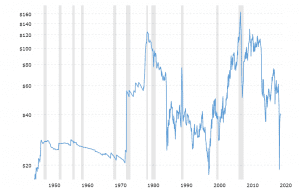If someone had given you $1 million to invest in 1970, then told you that the global population of 3.7 billion would double over the next 50 years, what would you have invested in? At the time, many would have gone for commodities. More people means more food, more oil consumption, and more raw materials.
Crude oil prices over the last 70 years
With your common sense approach you would have missed one of the biggest investment opportunities in history.
Consider that the price of oil in the middle of 1970 was approximately $22 per barrel. The price of oil now is about $40 per barrel. This is a 45% total return over 50 years. Not bad but compare that to a 3,785% total return for the S&P 500 over the same time frame.
The one thing Captain Obvious did not consider was the rise of technology.
Technological advancements have not only transformed our lives, they have also increased efficiency in many facets of life over the last 50 years including the production of oil, corn, and steel.
Technology is still winning and is leading the markets in recovery.
Technology has led the way in the market’s rapid recovery since the historic drop in March. Can this be a surprise to anyone? Tech has allowed us to adapt the way we live amid a pandemic, and thanks to tech many of the trends we are seeing may become part of a new normal.
To track the numbers, we look at the NASDAQ Composite Index. The NASDAQ Composite contains all of the companies that trade on the NASDAQ exchange. Appropriate, the NASDAQ was the first electronic exchange that allowed investors to buy and sell stock on a computerized, speedy, and transparent system, without the need for a physical trading floor. Many of stocks in the NASDAQ Composite are technology and internet-related, but there are financial, consumer, biotech, and industrial companies as well.
The NASDAQ vs. Dow Jones Industrial Average vs. S&P 500
With more than 3,300 stocks, the NASDAQ is considerably broader than the Dow with its 30 stocks or the S&P 500 with its (obvious) 500 stocks. However, the NASDAQ has an especially high concentration of technology stocks, so it is more sensitive to that industry than to other sectors. (This should not be confused with the NASDAQ 100, which is an index of the 100 largest companies listed on the NASDAQ).
Sensitive as it may be, the NASDAQ Composite has not disappointed. It has returned over 16% year-to-date (July 7, 2020). In contrast, the DJIA return is negative 8.5% year to date and the S&P 500 is negative by about 1.9%.
In March, many would not have forecasted a double-digit positive return on anything but toilet paper.
The Goliaths keep getting bigger while the smaller companies are left in the dust.
The ten largest stocks in the NASDAQ Composite by market capitalization– Microsoft, Apple, Amazon, Alphabet (Google), Facebook, Intel, Nvidia, Netflix, Cisco, and Adobe—have gained over $900 billion over the last two months. The other 3,000 or so companies in the index have lost about $300 billion.
The performers are large companies with balance sheets strong enough to weather the pandemic (at FourThought, we call these rare but consequential events) and even another market downturn if and when it occurs. Also, their earnings have not been fully disrupted, thanks to their ability to innovate. This is a testament to an investment focus of earnings consistency and balance sheet strength.
The nagging question: should we worry about another tech bubble?
An economic bubble is characterized by swells in asset prices significantly above the fundamental value of the assets. Bubbles are difficult to detect when they are growing because there is disagreement over the fundamental value of an asset.
Flashbacks to March of 2000 are not pleasant. “Irrational exuberance” was a term coined by former Federal Reserve Board chairman Alan Greenspan to describe the cause of the 1990s dot-com bubble in a 1996 speech he delivered.
One of the worst examples of fallout was the merger of AOL and Time Warner. Conducted in January of 2000, it was the largest merger of two American companies at the time, a deal valued at $350 billion. The market crashed in March and a trail of despair ensued. Jobs were lost, retirement accounts were decimated, and the regulatory authorities had their hands full.
When we remember the dot-com bubble many start-up internet companies come to mind. Priceline and Pets.com and other companies had a business plan to “change the world” by cornering a particular market and selling products at a loss in order to gain market share. These companies went into deep debt on advertising spending, but they were rewarded with sky-high market valuations that defied any ration.
Fear of missing out prevailed then. Are we seeing a repeat of that behavior?
During that period, many intelligent investors aborted their usual discipline and fell victim to the fear of missing out (FOMO) phenomenon.
Today, we are not seeing that same swell of non-profitable companies. The dot-com bust is still fresh in the minds of many investors and they learned their lesson. However, there is a disconnect between Wall Street and Main Street, USA. The stock market is thriving in the midst of a global pandemic, broad political unrest, and devastating unemployment. The stock market is putting its reputation as a leading indicator on the line.
Investing in technology is still wise when approached carefully.
Technology has a role in your portfolio if you are investing in the long-term advancement of mankind. It improves the quality, productivity, and profitability of the goods and services in our economy, just as it improved the commodities industry. The key to success is investing for long-term growth.
Discipline, diversification, and rebalancing your portfolio periodically are also critical. Remember that long-term growth is often accompanied by higher valuations and strong volatility. The tech industry is known for fierce competition and innovative disruption, companies have come and gone at the snap of a finger. It is not for the faint of heart. Polaroid and Blockbuster are ancient history to today’s youth.
Rely on technology to continue changing the world for good.
The continued growth and expansion of technology can be daunting, but it also give us hope. As of the writing of this post, more than 133,000 people have died from a deadly virus in the United States alone. We are relying on private institutions to develop therapies and a vaccine to combat the ongoing global threat, and technology will play a huge role in supporting the pharmaceutical companies racing to find those treatment and vaccines.
We also need innovation and empathy to improve the presence of justice in our communities.
From a personal place for many people and myself, I long for advancements in cancer treatments. My father recently lost a year-plus long battle with cancer. Even the word battle does not do his strength justice.
Here’s to hoping the best minds in the world will continue to make our world a better place, with the help of technology.

